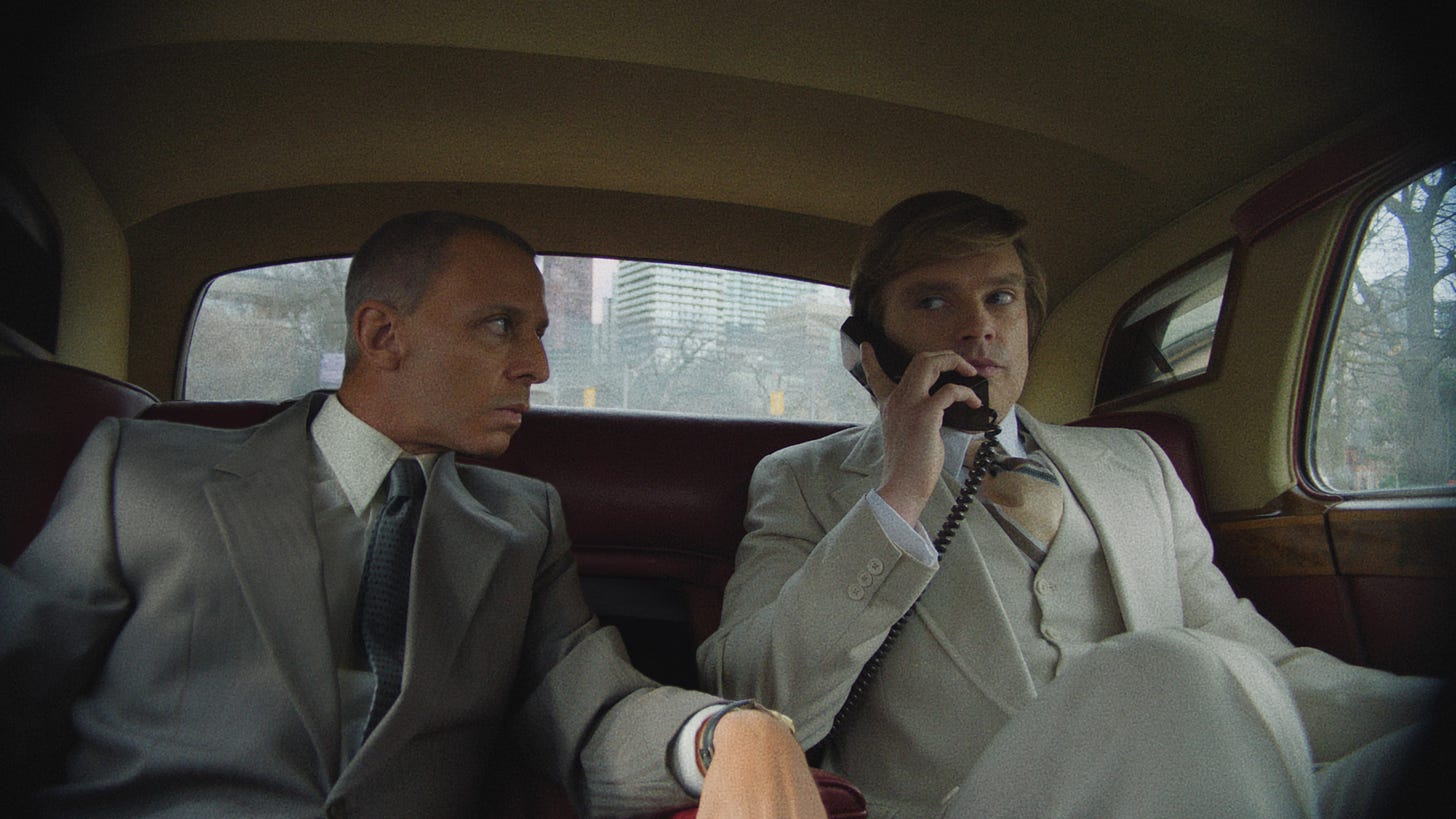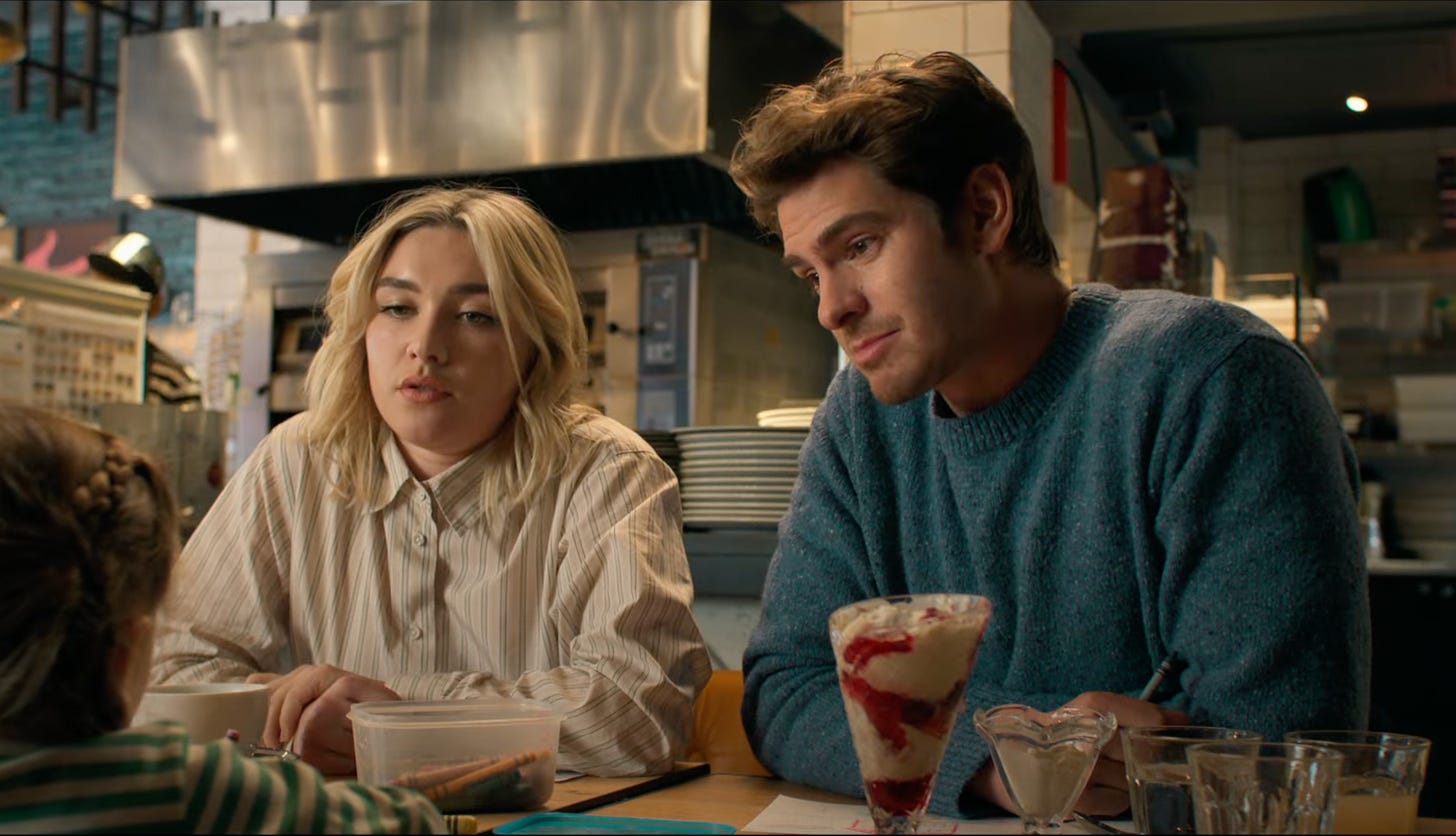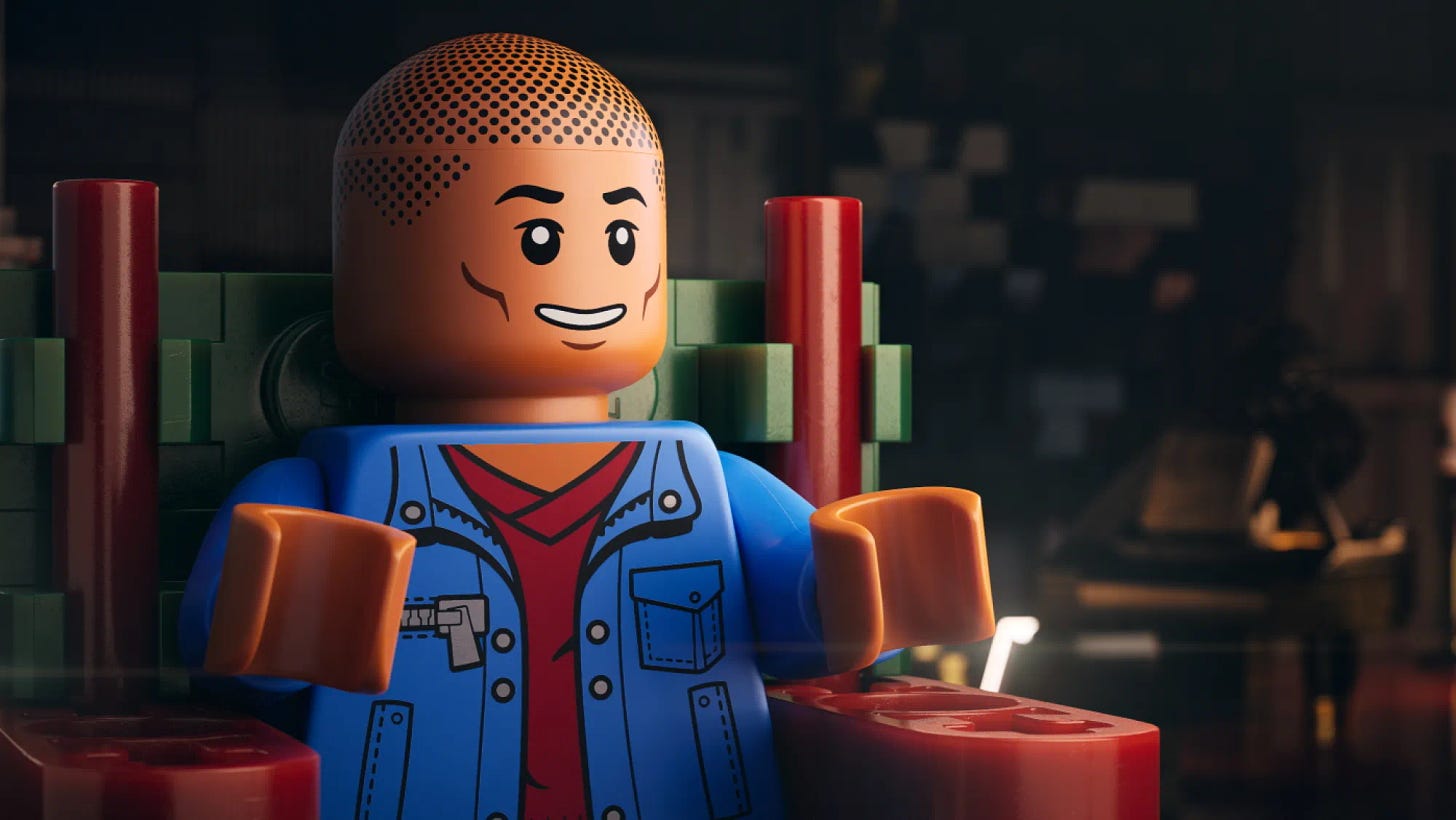In Review: 'The Apprentice,' 'We Live in Time,' 'Piece by Piece'
Donald Trump gets an origin story, Florence Pugh and Andrew Garfield get a life story, and Pharrell Williams gets a life story told in little bricks in this week's new movies.
The Apprentice
Dir. Ali Abbasi
123 min.
Donald Trump is not a complicated man. He’s more like an astronomical phenomenon, a black hole of vanity and neediness that swallows up whatever light and matter that comes near. He’s a cartoonish buffoon yet notoriously difficult to parody, at least until James Austin Johnson started wandering around Los Angeles in perfect Trump cadence, yammering about “Weird Al” Yankovic and Scooby-Doo. There are questions we will continue to ask ourselves about Trump’s political ascendance, like “How did this happen?” and “How is this still happening?”, but those aren’t really questions about the man himself, who again isn’t that mysterious. Those are questions about America, a telling barometer of where we were in the 1980s, when Trump became the personification of greed-is-good excess and conspicuous consumption, and where we are now, when he’s a shameless avatar of white grievance and fake disenfranchisement.
To that end, The Apprentice, a biopic that follows Trump’s rise as a real estate mogul in the ‘70s and ‘80s, is doomed to fail, at least as an American Crime Story-style docudrama that goes once-over-lightly through the important events of his life. There are times when the film feels like a Saturday Night Live sketch played straight, all slapped-together costumes and wigs and backdrops, recreating historical scenes for a punchline that never arrives. Yet director Ali Abassi and screenwriter Gabriel Sherman, a political journalist who worked the Trump (and Fox News) beat at Vanity Fair during Trump’s first term, seem at least semi-aware of the obstacle they’re facing. And so the film works best as a creature feature, with Trump as The Monster with two Dr. Frankensteins, his father Fred Trump and his lawyer Roy Cohn, who lose control of their creation. They’re surprised and saddened to be part of the countryside he marauds.
In the film’s telling, a young Donald Trump (Sebastian Stan) shows hustle and ambition as a would-be real estate mogul in the mold of his father Fred (Martin Donovan), who’s in trouble with the Department of Justice for housing discrimination. (At the dinner table, Trump Sr. complains, “How can I be racist when I have a Black driver?”) Trump dreams of turning the Commodore, a boarded-up hotel on 42nd Street, into the luxury spot that will eventually become Trump Tower, but his time hasn’t come yet. (In the sort of wink to the future that happens constantly in The Apprentice, he’s told that such a location will never be viable for a high-end property, right before he’s propositioned by a streetwalker.) But Roy Cohn (Jeremy Strong), the notoriously vicious lawyer who served as Joseph McCarthy’s right hand in the Red Scare and got Julius and Ethel Rosenberg executed for treason, spots a promising lump of clay for him to mold in his image. The film depicts Cohn and Trump locking eyes at an elite club as a love-at-first-sight moment.
Under Cohn’s guidance, which inevitably involves bribery and backroom dirty-dealing, Trump succeeds in getting the government to settle the discrimination lawsuit and the cash-strapped city to grant absurdly favorable terms for his real estate dreams. A few key Cohn principles—“attack, attack, attack,” “admit nothing, deny everything,” “always claim victory, never admit defeat”—become cornerstones of Trumpism as Trump works furiously to expand his brand and his empire, with his lawyer chipping in where needed. As Trump courts and marries a fashion model named Ivana (Maria Bakalova) and goes on an amphetamine-fueled buying spree in New York and Atlantic City, he starts spending less time with Cohn. And when Cohn’s closeted gay lifestyle, which he tries to ignore, moves into the AIDS era, Trump leaves his master in the cold.
As Trump, Stan wisely veers away from straight imitation, choosing instead to capture the essence of this shallow, vain, cruel, and deeply insecure man while suggesting the shame he feels over the faintest flicker of humanity he still possesses. In one scene, Trump gets furious when Ivana tries to comfort him over the loss of his alcoholic older brother Fred Jr., because he associates vulnerability with weakness. But The Apprentice belongs to Strong as Cohn, who also works hard to suppress his vulnerability and his conscience at all times, but isn’t quite as successful at doing it. Like his Kendall Roy on Succession, Strong has a gift for making a vile man pitiable without turning the dial all the way to sympathetic. His Cohn is fully human. Stan’s Trump is not—and perhaps could never be.
There was never any doubt that a film about Trump’s past would be speaking about Trump in the present, but The Apprentice focuses too heavily on the precepts and catchphrases that would become associated with his time in public service. The film opens with Richard Nixon’s “I am not a crook” speech—the one that claimed, as Trump does, that “I’ve earned everything I’ve got”—and includes his co-option of the slogan “Make America Great Again.” Abbasi and Sherman can’t resist hitting the lowlights of the period, too, like an incident of marital rape that Ivana once described (and later retracted) in her divorce deposition and Trump’s cosmetic surgeries to slim his midsection and remove his bald spot. But it never feels like we learn anything illuminating about Trump, which may speak to his toxic ubiquity for the last decade, but owes more to his uniquely shallow character. What can be gleaned from staring into the void? — Scott Tobias
The Apprentice opens in theaters everywhere tonight.
We Live in Time
Dir. John Crowley
107 min.
The easiest way to sum up the romantic drama We Live in Time is that it has a memorable meet-cute but not where you’d expect it. On the verge of a divorce and needing to sign the paperwork, Tobias (Andrew Garfield), an employee of the British cereal company Weetabix, stomps out of his hotel and to the nearest corner shop. Disconsolate and distracted, he’s hit by a car while crossing the street, then awakens in a hospital to the face of a stranger named Almut (Florence Pugh), the driver who put him there. They’re obviously destined to fall in love, but we know that already. By the time they meet, we’re already pretty deep into the movie’s non-chronological narrative. We know they get married and have a daughter. We also know that Almut becomes gravely ill, and more than once, the sort of ill that can lead a person to question how much they want to fight if they’re destined to lose.
Written by Nick Payne (The Sense of an Ending) and directed by John Crowley (Brooklyn, The Goldfinch), We Live in Time tells a familiar story in an unfamiliar way, freely jumping from one point in Tobias and Almut’s relationship to another as it tells their story out of sequence. But it’s not so unfamiliar as to make the journey from point A to point Z seem revelatory just because it stops first at points E, then S, then F. What’s more concerning is that, until the final scenes, We Live in Time doesn’t seem to have much of a sense of how to make its moments out of time comment on one another in any meaningful way.
Still, those final scenes will likely melt the frostiest of hearts. We Live in Time might be a formally overachieving tearjerker at heart, but it also knows how to, well, jerk tears. It also smartly gives Garfield and Pugh the space they need to develop three-dimensional characters and a complex relationship. They’re quite good together, both in We Live in Time’s dramatic scenes, in which they navigate the unthinkable without surrendering to melodrama or sentiment, and its comedic moments, particularly a sequence in which the couple runs into some roadblocks, almost literally, on the way to childbirth. Even when not every choice that’s gone into the film’s structure makes sense or resonates emotionally, they do. —Keith Phipps
In our timeline, We Live in Time arrives in New York and Los Angeles tonight before rolling out to more markets beginning next week.
Piece By Piece
Dir. Morgan Neville
93 min.
The great composer Carter Burwell, best known for his scores for Coen brothers movies like Raising Arizona and Fargo, once likened himself to a tailor, creating music that fits a particular film rather than something more one-size-fits-all or off-the-rack. That seems to be director Morgan Neville’s thinking, too, as he continues to turn out biographical documentaries built around archival footage (Best of Enemies, Won’t You Be My Neighbor?), live performances (The Music of Strangers: Yo-Yo Ma and the Silk Road Ensemble), or an interrogation of a person’s life (Roadrunner: A Film About Anthony Bourdain). And so, given Pharrell Williams, the multi-hyphenate singer/songwriter/rapper/producer/fashion designer, Neville has tailored a suit of animated Lego pieces, reflecting the pop sensibility of a star immersed in mainstream culture. The usual talking heads just won’t do.
That’s a fine idea for the prolific Neville, who’s made an industry out of slick and often solid documentaries about American icons, but Piece By Piece makes it seem like he has almost no other choice. After a quick tour of the artist’s hectic home, Lego Pharrell and Lego Neville sit down for a one-on-one interview that serves as a conventional backbone for the story of his life, but Pharrell tends to speak in vagaries, drifting off into musings on Carl Sagan and underwater kingdoms rather than bear down on his own feelings about his career trajectory. Maybe Lego is not the ideal medium for biographical storytelling or maybe Pharrell is an inherently elusive figure, but Piece By Piece is the rare documentary where you know little more about a subject heading out as you did heading in. Neville seems to hope Lego will provide the essence to make up for the missing substance.
The format makes for a zippy childhood origin story before the complications of fame and adulthood kick in. Raised in an apartment complex not far from the water in Virginia Beach, Pharrell describes himself as a music-obsessed weirdo who daydreamed in color, but grew up around a community where songs and musicians were everywhere. He and a key future collaborator, Chad Hugo, bonded in middle-school band class and later founded the four-piece band The Neptunes, which rocked the high-school talent show so hard that super-producer Teddy Riley, who’d just set up shop across the street, signed them after graduation. From there, Pharrell wrote Riley’s verse on Wreckx-n-Effect’s 1992 hit “Rump Shaker”—a funny sequence shows how quickly he burned through the fat check he got for that one—and The Neptunes would produce a slew of hits for Jay-Z, Mystikal, Nelly, and Justin Timberlake.
Neville gets Lego interviews with many of those stars as well as other collaborators from the Virginia Beach scene, like Missy Elliott and Timbaland, and dips into Pharrell’s nascent stardom and expansion into the fashion world. Then there’s quite a bit of yadda-yadda-yadda. Piece By Piece is a rise and fall and rise again documentary, but the part where Pharrell hits a few personal and professional bumps in the road seems intentionally vague. The name Robin Thicke is not dwelled upon and it feels like the whole “Blurred Lines” era of Pharrell’s career is whisked through faster than you can say “Emily Ratajkowski.” It turns out that working with Daft Punk is much cooler, to say nothing of the Despicable Me 2 smash “Happy,” which is the track that really makes the Lego come to life. Yet the surface-level portraiture seems built into the conceit, including the title, which suggests in Lego terms how Pharrell assembles his inspirational creative life. For this film, it doesn’t snap so easily into place. — Scott Tobias
Piece By Piece opens in theaters everywhere tonight.











On the podcast The Town, they mentioned that after Lego Ninjago and the Lego Movie sequel didn't do well, Warner Bros let the rights to Lego lapse. Universal quickly pounced. Only they then found out they couldn't do anything with any characters established under Warner Bros, and they didn't really have any ideas of their own.
So they've just been sitting on the rights with nothing to do, and when Pharrell and Neville were working on coming up with a non-traditional approach to the biopic, Universal pitched the Lego idea so that they would have something to do with their property.
With the first trailer, I initially assumed maybe Pharrell had a deep personal connection to Legos and had really wanted to construct his story using them in an intrinsic and meaningful way. But learning that it was just a corporate idea to put two properties together really sucked the air out of any desire to see it.
THE APPRENTICE:
1) this 100% should have been a comedy
2) I'm unclear on the timeline this covers. if it ends before the 90s collapse of his empire, it's complete hagiography of his business "acumen". By the late 90s he was a complete joke in the Northeast, and it was only the TV show that created his popular public persona of "success"